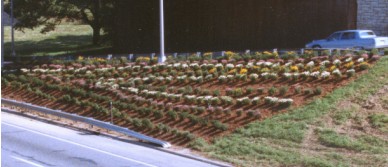821.22 Weed Control in Landscaped Areas: Difference between revisions
m Per MT, new products with the new 2017 bid have replaced old products |
mNo edit summary |
||
| Line 34: | Line 34: | ||
:1. Spot treatments of glyphosate as needed to control existing weeds. | :1. Spot treatments of glyphosate as needed to control existing weeds. | ||
'''Special Recommendations:''' | '''Special Recommendations:''' | ||
Latest revision as of 10:36, 23 February 2017
Definition: Prevention and control of undesirable vegetation in and around landscaped locations

Why:
1. Improves appearance of landscaped areas
2. Minimizes the need for mechanical or manual control
3. More cost effective as fewer visits to site are needed
Primary Sites:
1. Areas on the right of way planted with trees, shrubs, flowers, etc. that are maintained as distinct landscapes
2. Areas that have been mulched due to mowing difficulty as in tree groupings and along bridge ends
3. Maintained plantings at department facilities such as offices and rest areas
Methods:
A. Calibration. Most products applied with handgun or backpack/hand sprayer (see EPG 821.11 for calibration for hand spayer)
B. Recommended Products and Rates
- 1. Glyphosate (non-selective post emergent) – 1 to 2 gallons per 100 gallons
- 2. Additive for glyphosate product according to label
C. P.P.E.
Follow label recommendations
D. When to Apply
- 1. Spot treatments of glyphosate as needed to control existing weeds.
Special Recommendations:
A. Read the label
B. Location Concern
1. Care needed when spot treating with glyphosate to avoid contact with landscape plantings to prevent damage
C. Weather
1. Avoid drift with glyphosate
D. Clean-up and Disposal
1. Follow label recommendations
2. Pendulum requires constant agitation and should not be allowed to settle
E. Mode of Action
1. Glyphosate only controls actively growing vegetation